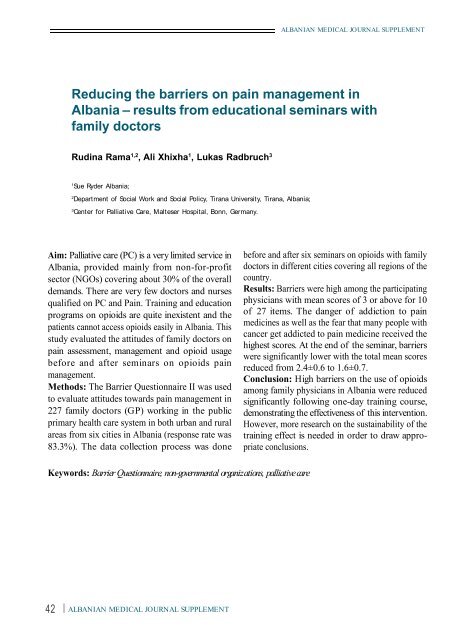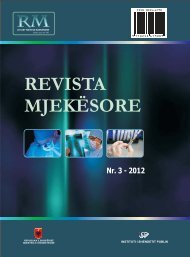in Albania - Instituti i Shendetit Publik
in Albania - Instituti i Shendetit Publik
in Albania - Instituti i Shendetit Publik
You also want an ePaper? Increase the reach of your titles
YUMPU automatically turns print PDFs into web optimized ePapers that Google loves.
ALBANIAN MEDICAL JOURNAL SUPPLEMENTReduc<strong>in</strong>g the barriers on pa<strong>in</strong> management <strong>in</strong><strong>Albania</strong> results from educational sem<strong>in</strong>ars withfamily doctorsRud<strong>in</strong>a Rama 1,2 , Ali Xhixha 1 , Lukas Radbruch 31Sue Ryder <strong>Albania</strong>;2Department of Social Work and Social Policy, Tirana University, Tirana, <strong>Albania</strong>;3Center for Palliative Care, Malteser Hospital, Bonn, Germany.Aim: Palliative care (PC) is a very limited service <strong>in</strong><strong>Albania</strong>, provided ma<strong>in</strong>ly from non-for-profitsector (NGOs) cover<strong>in</strong>g about 30% of the overalldemands. There are very few doctors and nursesqualified on PC and Pa<strong>in</strong>. Tra<strong>in</strong><strong>in</strong>g and educationprograms on opioids are quite <strong>in</strong>existent and thepatients cannot access opioids easily <strong>in</strong> <strong>Albania</strong>. Thisstudy evaluated the attitudes of family doctors onpa<strong>in</strong> assessment, management and opioid usagebefore and after sem<strong>in</strong>ars on opioids pa<strong>in</strong>management.Methods: The Barrier Questionnaire II was usedto evaluate attitudes towards pa<strong>in</strong> management <strong>in</strong>227 family doctors (GP) work<strong>in</strong>g <strong>in</strong> the publicprimary health care system <strong>in</strong> both urban and ruralareas from six cities <strong>in</strong> <strong>Albania</strong> (response rate was83.3%). The data collection process was donebefore and after six sem<strong>in</strong>ars on opioids with familydoctors <strong>in</strong> different cities cover<strong>in</strong>g all regions of thecountry.Results: Barriers were high among the participat<strong>in</strong>gphysicians with mean scores of 3 or above for 10of 27 items. The danger of addiction to pa<strong>in</strong>medic<strong>in</strong>es as well as the fear that many people withcancer get addicted to pa<strong>in</strong> medic<strong>in</strong>e received thehighest scores. At the end of the sem<strong>in</strong>ar, barrierswere significantly lower with the total mean scoresreduced from 2.4±0.6 to 1.6±0.7.Conclusion: High barriers on the use of opioidsamong family physicians <strong>in</strong> <strong>Albania</strong> were reducedsignificantly follow<strong>in</strong>g one-day tra<strong>in</strong><strong>in</strong>g course,demonstrat<strong>in</strong>g the effectiveness of this <strong>in</strong>tervention.However, more research on the susta<strong>in</strong>ability of thetra<strong>in</strong><strong>in</strong>g effect is needed <strong>in</strong> order to draw appropriateconclusions.Keywords: Barrier Questionnaire, non-governmental organizations, palliativecare42 ALBANIAN MEDICAL JOURNAL SUPPLEMENT




